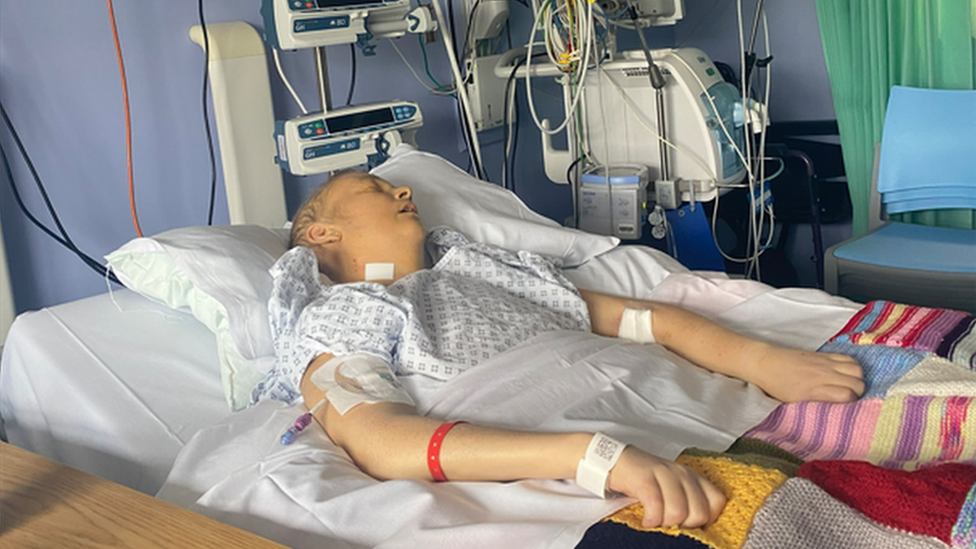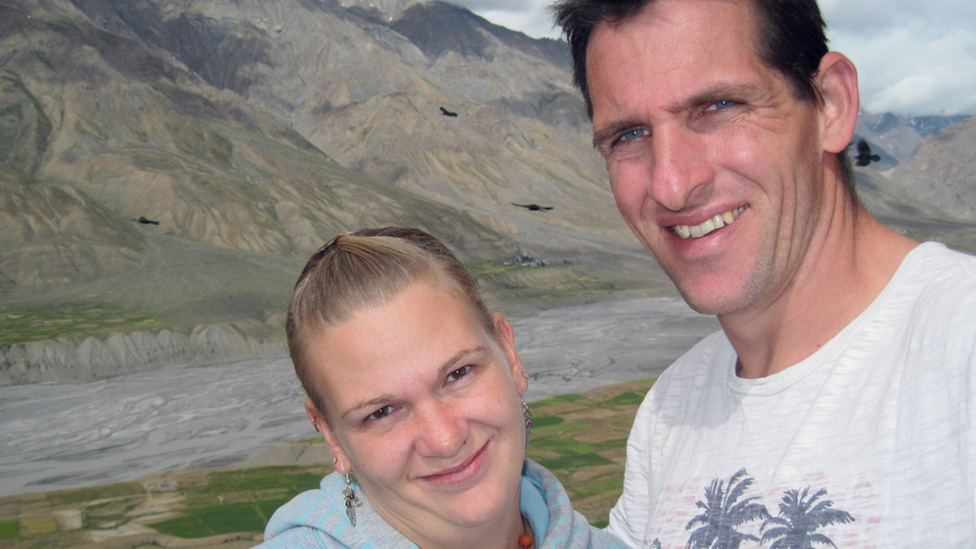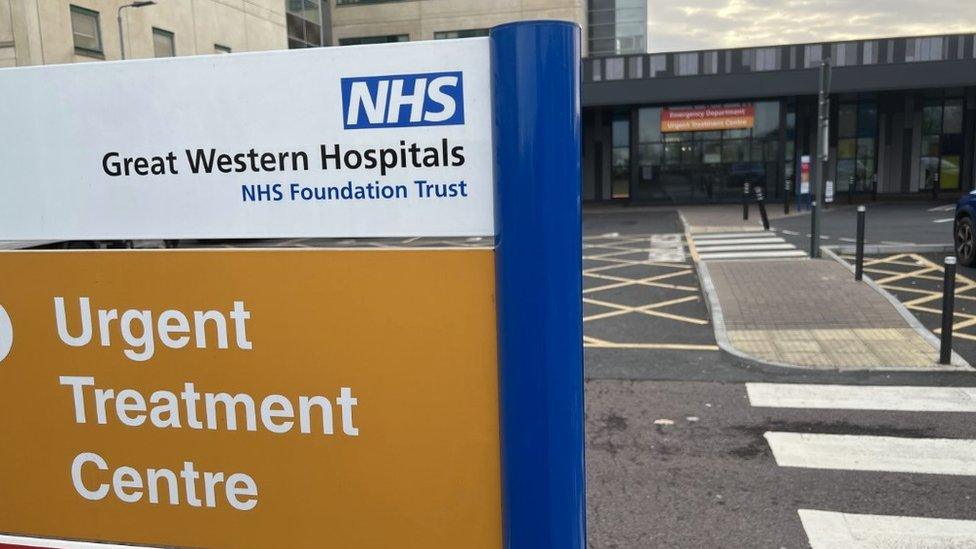Mother 'starved to death' after abdominal pains
- Published

Claire Boyd was originally being treated for abdominal pains
A man claims his wife starved to death in hospital while she was being treated for abdominal pains.
Kevin Boyd said clinicians at Swindon's Great Western Hospital failed to notice Claire had lost almost half her body weight in a matter of months.
Treatment left her with "short-gut syndrome" and she required artificial feeding, which did not happen, meaning she lost weight.
Two hospitals have carried out reviews and offered their condolences.
Mrs Boyd's problems began in October 2021 when she was referred to University College London for an examination to investigate abdominal pain.
As a result of the endoscopic retrograde cholangiopancreatogram (ERCP) procedure, she developed an inflammation of the pancreas.
She was admitted to intensive care where they found a catastrophic blood clot which restricted blood flow to her intestines, causing a dangerous infection.

Claire and Kevin Boyd shared a passion for adventure
Mr Boyd said doctors told the couple the procedure was a "routine appointment".
"I was literally waiting at the hospital to take her home because we were led to believe this would be a two-hour appointment but then I find out she is staying in hospital, [in an] induced coma in intensive care," he said.
A blood test carried out shortly before the endoscopy showed Mrs Boyd's blood was clotting far too quickly - something that put her at increased risk of developing a clot.
But an anti-clotting drug she was put on afterwards was paused.
That is because the NHS computer system does not necessarily remind doctors that a prescription may need to be restarted.
In a letter, her consultant formally apologised about the "devastating complication, as well as the subsequent prescribing error".
Mr Boyd explained none of the clinical team spotted the drug had not been restarted and that Mrs Boyd's case might not be a one-off.
"In an off-guarded moment, a consultant at University College London told me that they had seen this before," he said.

Claire was treated at UCLH in London and at Swindon's Great Western Hospital
Mrs Boyd had lived with the abdominal pains for eight years and her husband is now questioning the need for the procedure.
He said: "Did it really need treating? It's something you can live with and I do think there was a little bit of coercion into getting her to consent to the ERCP, which I now know is a pretty high risk procedure."
Mrs Boyd was left with "short gut syndrome" - a condition that requires artificial feeding. But in her case this did not happen and she started losing weight dramatically.
She was eventually discharged home to Devizes in January 2022, but Mr Boyd said that should never have happened.
"She did faint in the car on the way home and her body temperature was reduced by two degrees which is a very clear sepsis marker," he said.
"She was unable to move off the sofa."
Weight fell by four stone
Three days later, the 41-year old mother-of-two was rushed by ambulance to Great Western Hospital (GWH) in Swindon. Her weight had fallen by 27 kg, more than four stone.
Mrs Boyd died on 13 May 2022 of multi-organ failure, weighing less than 46kg - just over seven stone.
Mr Boyd said his wife's weight was not monitored properly.
"After her death, I now know that at the London hospital she was only weighed three times in an a hospital stay of 111 days," he said.
"In the Swindon hospital she was only weighed two times in a hospital stay of four months."
Doctors treating Claire at GWH thought she was suffering from post-traumatic stress disorder (PTSD) relating to her experience in London.
A case review by a mental health specialist found professionals expressed concern she was experiencing PTSD, but this did not appear to be well communicated to the mental health team by the Swindon hospital.
'Robust processes'
It is documented there were concerns about the patient's non-compliance with treatment in her final weeks, but again this was not communicated to Avon and Wiltshire Mental Health Partnership.
Therefore nobody considered that Claire's ability to make decisions had been impacted by the trauma she had experience.
The case review concluded: "The AWP liaison team lacked professional curiosity about the reasons for the referral to them and noted that there were 'no concerns' and therefore she was discharged form their service, despite concerns being raised about PTSD."
Mr Boyd said: "It was obvious to me there were signs of mental capacity problems caused by PTSD and malnutrition.
"It was all there. I was telling the medics but nobody was listening to me."
Both GWH and UCLH have carried out internal reviews - with the London hospital saying it has "implemented more robust processes for medicines management and patient monitoring".
GWH said although this review did not identify anything wrong with her treatment, it has introduced a number of improvements.
This includes involving families and carers earlier on in mental capacity assessments, buying equipment to weigh a patient in bed, and involving a dietician at an earlier stage for patients who are at risk of malnutrition.
Mr Boyd now hopes an inquest will find the answers he is searching for over a tragedy that continues to haunt him.

Follow BBC West on Facebook, external, X, external and Instagram, external. Send your story ideas to: bristol@bbc.co.uk , external